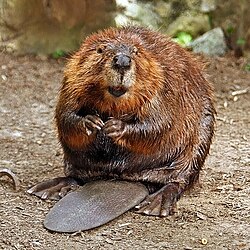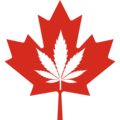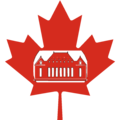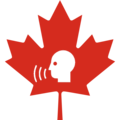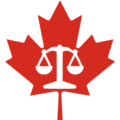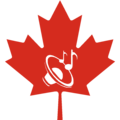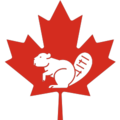Portal:Canada
| Showcase | Contents | Contributing |
Introduction
Canada is a country in North America. Its ten provinces and three territories extend from the Atlantic Ocean to the Pacific Ocean and northward into the Arctic Ocean, making it the world's second-largest country by total area, with the world's longest coastline. Its border with the United States is the world's longest international land border. The country is characterized by a wide range of both meteorologic and geological regions. With a population of just over 41 million people, it has widely varying population densities, with the majority residing in urban areas and large areas of the country being sparsely populated. Canada's capital is Ottawa and its three largest metropolitan areas are Toronto, Montreal, and Vancouver.
A developed country, Canada has a high nominal per capita income globally and its advanced economy ranks among the largest in the world by nominal GDP, relying chiefly upon its abundant natural resources and well-developed international trade networks. Recognized as a middle power, Canada's support for multilateralism and internationalism has been closely related to its foreign relations policies of peacekeeping and aid for developing countries. Canada promotes its domestically shared values through participation in multiple international organizations and forums. (Full article...)
Featured article -

The history of the National Hockey League begins with the end of its predecessor league, the National Hockey Association (NHA), in 1917. After unsuccessfully attempting to resolve disputes with Eddie Livingstone, owner of the Toronto Blueshirts, executives of the three other NHA franchises suspended the NHA, and formed the National Hockey League (NHL), replacing the Livingstone team with a temporary team in Toronto, the Arenas. The NHL's first quarter-century saw the league compete against two rival major leagues—the Pacific Coast Hockey Association and Western Canada Hockey League—for players and the Stanley Cup. The NHL first expanded into the United States in 1924 with the founding of the Boston Bruins, and by 1926 consisted of ten teams in Ontario, Quebec, the Great Lakes region, and the Northeastern United States. At the same time, the NHL emerged as the only major league and the sole competitor for the Stanley Cup; in 1947, the NHL completed a deal with the Stanley Cup trustees to gain full control of the Cup. The NHL's footprint spread across Canada as Foster Hewitt's radio broadcasts were heard coast-to-coast starting in 1933. (Full article...)
Current events
- May 1, 2025 – 2025 Southwest United States measles outbreak
- North America's three largest measles outbreaks continue to expand, with over 2,500 confirmed cases. There have been three fatalities in the United States and one in Mexico. The outbreaks began in Ontario, Canada, then surged in Texas and New Mexico, and have quickly escalated in Chihuahua, Mexico. (AP News)
- April 28, 2025 – 2025 Canadian federal election
- Voters in Canada go to the polls to elect the 343 members of the House of Commons to the 45th Canadian Parliament. (BBC)
- The Liberal Party under leader Mark Carney is projected to form government for the party's fourth consecutive mandate, with Carney remaining prime minister. (The Globe and Mail)
- Conservative Party leader Pierre Poilievre and New Democratic Party leader Jagmeet Singh lose their seats, with the NDP also losing official party status in the House. Each make speeches conceding the election, with Singh announcing his intention to resign as party leader. (CTV News)
- April 27, 2025 – 2025 Vancouver car attack
- The death toll from yesterday's vehicle-ramming attack at a street festival in Vancouver, British Columbia, Canada, rises to eleven with at least 20 others injured, making the attack tied for the deadliest vehicle-ramming attack in Canadian history. The British Columbia Prosecution Service charges the perpetrator with eight counts of second-degree murder, while investigators also rule out terrorism. (CTV News) (AP)
- April 26, 2025 – 2025 Vancouver car attack
- Nine people are killed and several others injured, after a car is driven through a crowd at a Philippine-Canadian festival in Vancouver, British Columbia, Canada. (Al Jazeera)
Selected panorama -
National symbol -
The North American beaver (Castor canadensis) is one of two extant beaver species, along with the Eurasian beaver (Castor fiber). It is native to North America and has been introduced in South America (Patagonia) and Europe (primarily Finland and Karelia). The North American beaver is one of the national symbols of Canada and the official state mammal of Oregon and New York. North American beavers are widespread across the continental United States, Canada, southern Alaska, and some parts of northern Mexico. (Full article...)
Selected vital article -
The history of Canada covers the period from the arrival of the Paleo-Indians to North America thousands of years ago to the present day. The lands encompassing present-day Canada have been inhabited for millennia by Indigenous peoples, with distinct trade networks, spiritual beliefs, and styles of social organization. Some of these older civilizations had long faded by the time of the first European arrivals and have been discovered through archeological investigations. (Full article...)
Selected picture -
Featured biography -
Peter Charles Archibald Ewart Jennings CM (July 29, 1938 – August 7, 2005) was a Canadian-American television journalist, best known for serving as the sole anchor of ABC World News Tonight from 1983 until his death from lung cancer in 2005. Despite dropping out of high school, Jennings transformed himself into one of American television's most prominent journalists. (Full article...)
Did you know -

- ... that Irene Parlby was one of The Famous Five, a group of women in Canada who fought for the right of women to be considered "persons"?
- ... that when Ralph Sazio, a Canadian Football Hall of Fame inductee, visited Boston University to scout a player, he became so impressed by Dave Viti that he signed him instead?
- ... that Canadian paediatrician Gladys Boyd was one of the first physicians to treat diabetic children with insulin?
- ... that Canadian peacekeepers participated in every UN peacekeeping effort from its inception until 1989?
- ... that the only populated place on Kaipokok Bay in Labrador, Canada, is Postville?
- ... that when the Canadian baritone Iain MacNeal appeared as Odysseus in Dallapiccola's Ulisse at the Oper Frankfurt, a reviewer noted that he portrayed the "character's self-exegeses"?
- ... that Ausma Malik is the first hijab-wearing Muslim woman to be elected to public office in Canada?
Featured list -
The Parliament of Canada is the legislative body of the government of Canada. The Parliament is composed of the House of Commons (lower house), the Senate (upper house), and the sovereign, represented by the governor general. Most major legislation originates from the House, as it is the only body that is directly elected. A new parliament begins after an election of the House of Commons and can sit for up to five years. The number of seats in parliament has varied as new provinces joined the country and as population distribution between the provinces changed; there are currently 338 House MPs and 105 Senators (when there are no vacancies). (Full article...)
Main articles
Associated Wikimedia
The following Wikimedia Foundation sister projects provide more on this subject:
-
Commons
Free media repository -
Wikibooks
Free textbooks and manuals -
Wikidata
Free knowledge base -
Wikinews
Free-content news -
Wikiquote
Collection of quotations -
Wikisource
Free-content library -
Wikiversity
Free learning tools -
Wikivoyage
Free travel guide -
Wiktionary
Dictionary and thesaurus




